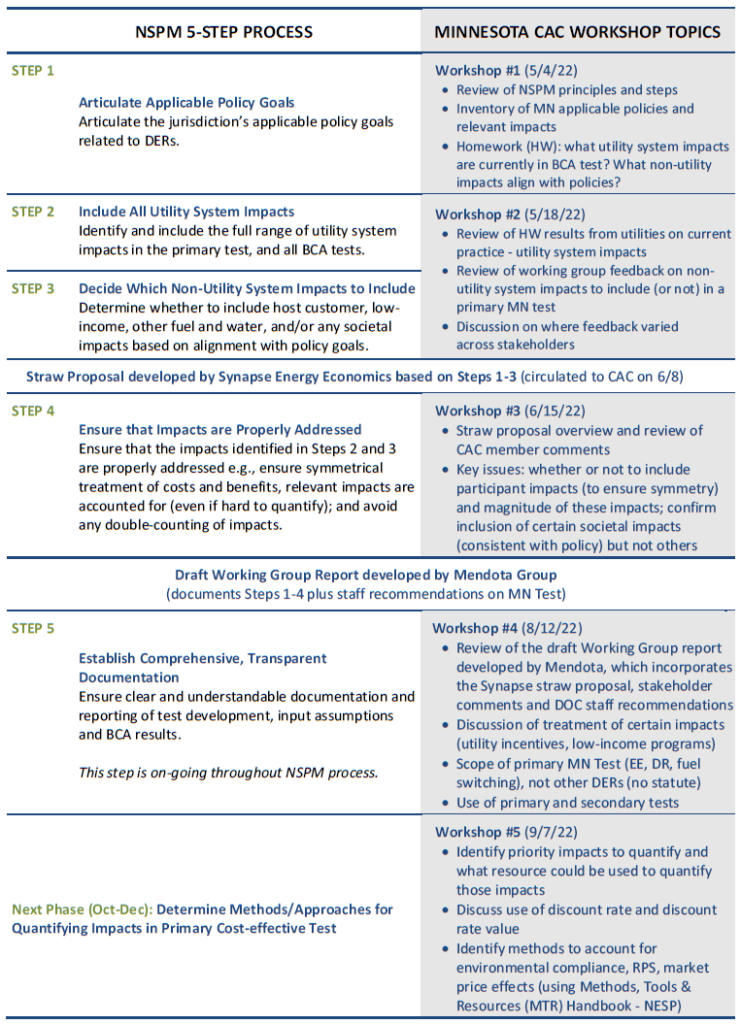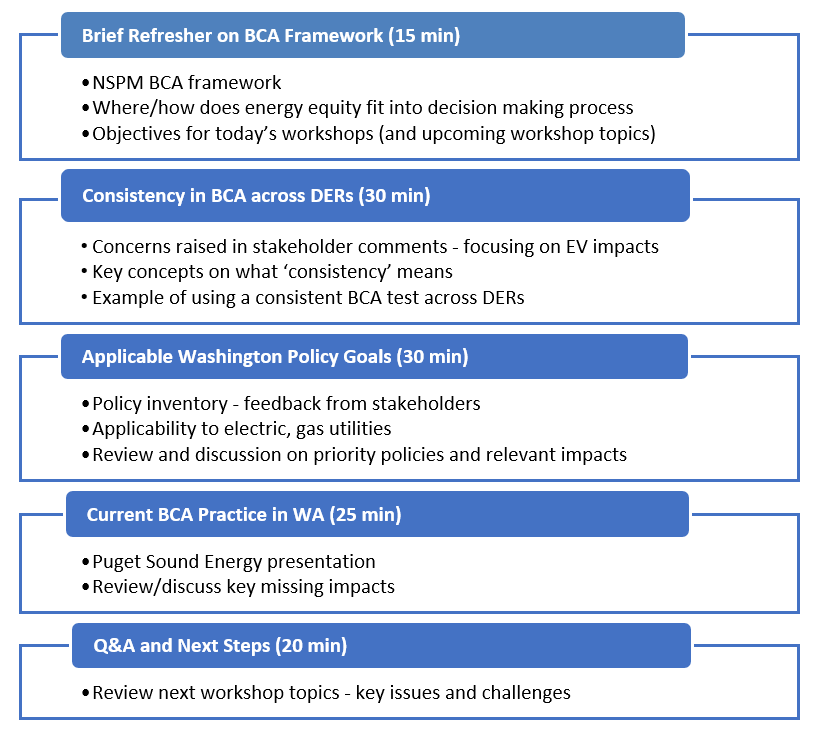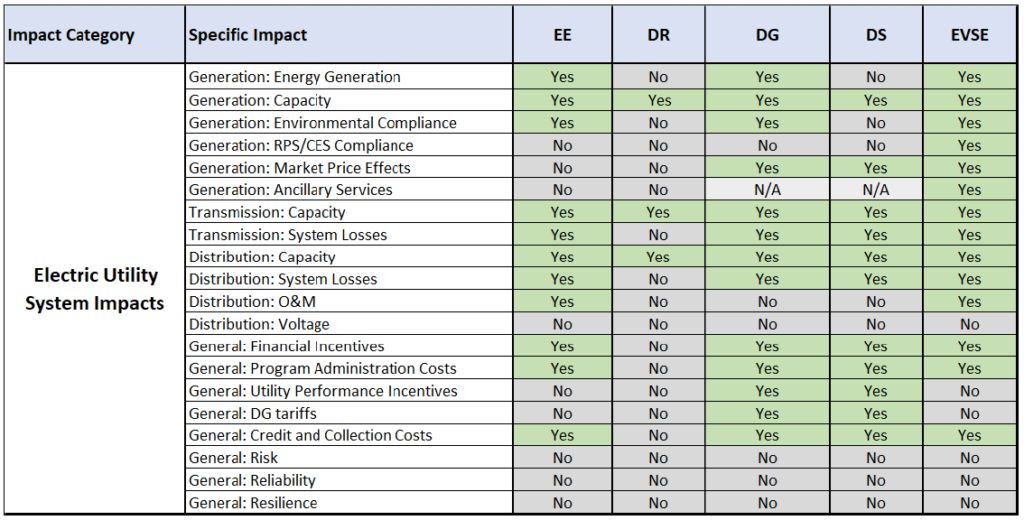How Are States Using the NSPM?
(Continued from NESP Quarterly October 5, 2022)
Minnesota
The table below summarizes the MN NSPM workshops to date. These are facilitated by the Department of Commerce (DOC) staff with support from the DOC’s lead consultant, Mendota Group, and with technical assistance from Synapse Energy Economics (“Synapse”) on NSPM application (funded by US DOE/LBNL). Stakeholders in the Cost-Effectiveness Advisory Committee (CAC) include utilities, state agencies, and nearly 20 other interested organizations.
The first two workshops, led by Synapse, walked the CAC through the key steps of identifying what impacts to include in Minnesota’s primary cost-effectiveness test. This process informed Synapse’s development of a straw proposal with a new Minnesota Test (MN Test) for stakeholder review. The third workshop focused on stakeholder feedback on the straw proposal. With this input, Mendota prepared a draft Working Group Report that incorporated the straw proposal and stakeholder comments, along with DOC staff’s recommendation for a new Minnesota Test (MN Test) and use of secondary tests, as required by statute.

With the draft MN Test in place, the CAC has moved to the next phase of the NSPM process, which is to identify methodologies to quantify impacts for use in cost effectiveness. As presented by Synapse in Workshop #5, this effort will refer to the MTR Handbook (a companion resource to the NSPM) to guide selection of appropriate methodologies for quantifying various impacts. Identifying methods to account for relevant impacts in this phase will be informed by white papers developed by the utilities and others in the following areas:
- Develop Utility System Impacts values and document how factors are calculated and incorporated into BCA modeling.
- Develop Non-Utility System Impacts values and document how factors are calculated and incorporated into BCA modeling.
- Develop Efficient Fuel-Switching and Load Management Cost-Effectiveness Guidelines, and apply approach adopted for the MN Test to evaluate Efficient Fuel-Switching and Load Management programs.
- Determine Discount Rates to use in cost-effectiveness analyses, informed by previous MN guidance.
The DOC anticipates that the CAC will have four more meetings in 2022, with the CAC process concluding by January 2023. Near the conclusion of the CAC process, there will be a formal regulatory process set by Minnesota rules and statute. During this regulatory process, the DOC will develop a written Staff Proposed Decision with recommendations about cost-effectiveness methodology updates, followed by a public comment period. In early 2023, the Department will issue the Deputy Commissioner’s Final Decision filing, which will set the cost-effectiveness assumptions that the utilities will be required to use for their 2024-2026 CIP Triennials.
To learn more about the Minnesota’s experience applying the NSPM BCA framework, read our previous newsletter coverage and see MN NSPM workshop materials
Washington
Since kicking off the NSPM process at its May 10 Workshop in Docket UE-210804, the Washington Utilities and Transportation Commission (UTC) convened stakeholders on August 1 and September 20 to bring cost-effectiveness testing practices into alignment with applicable policies — in particular, related to the state’s CETA statute and Climate Commitment Act – and to support clean energy rule requirements. The summer workshop agendas generally followed the NSPM 5-step process as shown below, while illustrating specific Washington priorities. As it takes steps to review and update its BCA practices, Washington aims to ensure it can meet its policy needs.
Workshop #2 Agenda (August 1, 2022)

Workshop #3 (September 20, 2022)
During Workshop #3, stakeholders reviewed and discussed current utility BCA practice for treatment of utility and non-utility system impacts, using Puget Sound Energy data as reported below (and similar tables for host customer and societal impacts.

The concluding workshop assignment from UTC staff was a request for the utilities to indicate, where utility system impacts are not included in current BCA practice, the reason for exclusion — e.g., due to lack of data, or impacts considered not applicable or not material. In cases where an impact is applicable and material, utilities are asked to recommend a general approach/method for quantifying or accounting for the impact.
Subsequent to Workshop #3 and additional information requested from the utilities, a Straw Proposal will be developed by Synapse Energy Economics (via LBL funding for state technical assistance) and will be circulated to stakeholders for comment and discussion at a workshop scheduled for late October.
Additional workshop topics to be addressed during the NSPM process include use of secondary tests, selecting discount rates, and accounting for energy equity. All docket and workshop meeting materials are posted to the WA UTC website for Docket UE-210804. For more information on the WA process, see our previous newsletter coverage.
Maine
Pursuant to Public Law 2021 Chapter 390 (LD 936, An Act To Amend State Laws Relating to Net Energy Billing and the Procurement of Distributed Generation), the Governor’s Energy Office convened the Distributed Generation (DG) Stakeholder Group to issue recommendations that support continued development of renewable energy in Maine through cost-effective distributed generation, including meeting a goal of 750 megawatts (MW) of DG under the net energy billing programs established in 35-A MRS §3209-A and §3209-B.
Per LD 936, the charge of the DG Stakeholder Group is to “consider various distributed generation project programs to be implemented between 2024 and 2028 and the need for improved grid planning.” The DG Stakeholder Group produced an interim report in December 2021 establishing initial areas of consensus and describing a framework and intended design process for a successor program. The areas of consensus included articulating clear policy goals based on legislation, and recognizing the importance of accounting for DG potential benefits to the electric system, as well as to the state — through avoided costs, plus resilience, environmental, public health, and economic benefits.
Synapse Energy Economics will provide technical analysis to fulfill the requirements of LD 936 Section 4 as specified in the RFP, provide technical and program design support for the development of the DG program, and facilitate stakeholder engagement to obtain and incorporate public input.

